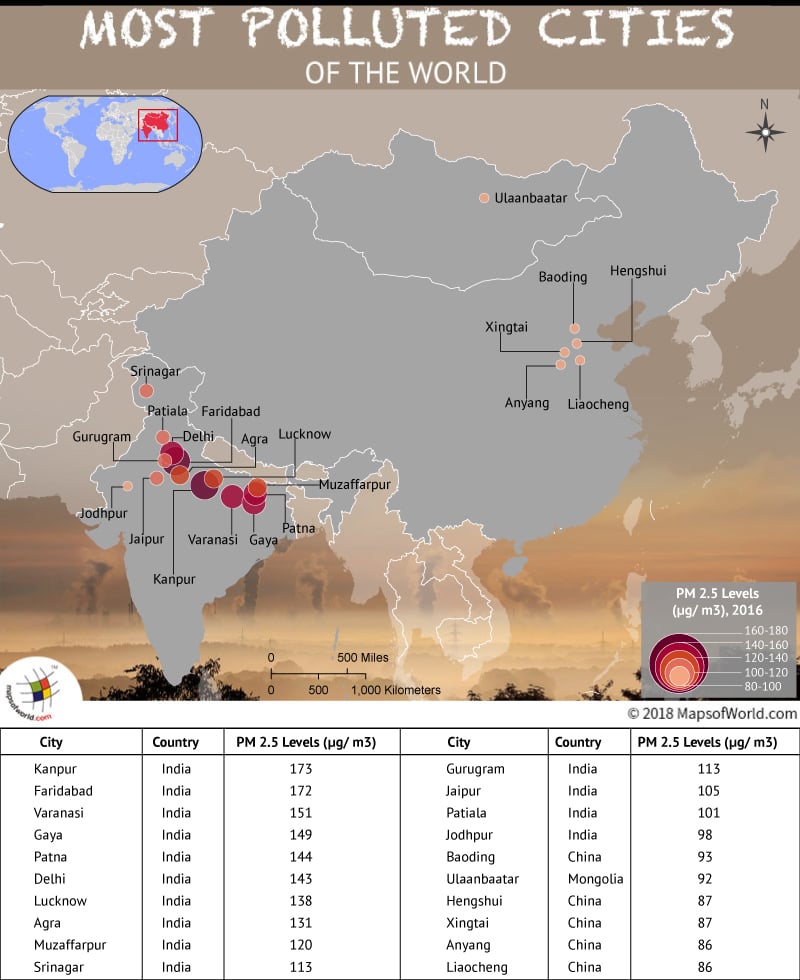What are the most air polluted cities in the world?
Scientists believe that the human body can survive about 3 weeks without food, about 11 days without sleep, three or four days without water, but only about 3 minutes without air. Despite this, air pollution is rampant and well over 3 million people in the world are breathing polluted air each day. The most recent data on air pollution levels released by the World Health Organization (WHO) looks at pollution and atmospheric particulate matter (PM) 2.5 across the world tracked in 2016 and comes up with some alarming statistics.
PM 2.5 refers to particulate matter in the air with a diameter less than 2.5 mm. These are so fine and small that they can only be detected by an electron microscope, and their lightness enables them to stay suspended in the air for a long time. This means that the chances of these particles being inhaled by human beings or animals and the risks of suffering from lung and respiratory damage is very high. WHO says, “Chronic exposure to particles contributes to the risk of developing cardiovascular and respiratory diseases, as well as of lung cancer.” PM concentrations are measured in terms of micrograms per cubic meter (μg/m3).
According to WHO standards, the annual PM 2.5 safe limit is 10 micrograms/m3. The list of most polluted cities of the world released by the WHO has an annual PM 2.5 level which is many times that of the safe limit. All of the cities that featured in the list of world cities with highest OM 2.5 levels are in Asia. These are also the most populated places in the world and 14 of the 20 cities are in India. This means that 9 out of 10 people on earth are exposed to unacceptably high levels of air pollution. The WHO study also said that in 2016 about 3.8 million people across the globe died from pollution related causes and that this pollution came “from cooking with polluting fuels and technologies.”
| City | Country | PM 2.5 Levels (μg/ m3) |
| Kanpur | India | 173 |
| Faridabad | India | 172 |
| Varanasi | India | 151 |
| Gaya | India | 149 |
| Patna | India | 144 |
| Delhi | India | 143 |
| Lucknow | India | 138 |
| Agra | India | 131 |
| Muzaffarpur | India | 120 |
| Srinagar | India | 113 |
| Gurgaon | India | 113 |
| Jaipur | India | 105 |
| Patiala | India | 101 |
| Jodhpur | India | 98 |
| Baoding | People’s Republic of China | 93 |
| Ulaanbaatar | Mongolia | 92 |
| Hengshui | People’s Republic of China | 87 |
| Xingtai | People’s Republic of China | 87 |
| Anyang | People’s Republic of China | 86 |
| Liaocheng | People’s Republic of China | 86 |
India has stepped up the pace of its industrial development over the past few decades. The country, however, is yet to come to terms with the cost of this rapid development and its toll on the environment. India is yet to draft any meaningful legislation to combat pollutants and come up with constructive action to reverse the situation. Cities such as Kanpur and Faridabad have PM 2.5 levels almost 10 times the acceptable levels. The national capital Delhi is also among the 10 worst (air) polluted cities of the world. This is despite the fact that a partial automobile regulation is implemented in the city during winters. The smoke-filled air in these Indian cities is lethal for older people, children, and those with chronic cardiac or respiratory ailments.
The People’s Republic of China, the most populated city in the world also seems be among the worst affected countries with about 5 of 20 cities. A look at the pollution levels in Chinese cities a few years ago, however, seems to indicate that China is taking effective measures to reduce air pollution and things are looking up. The improvement is a result of the Chinese government’s “war on air pollution”, says the UN.
Know more:
Related maps:


